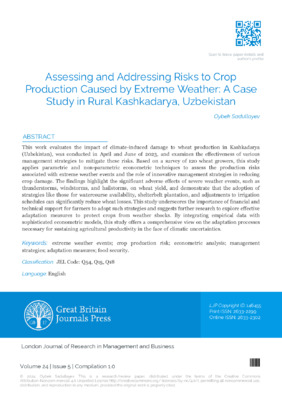Assessing and Addressing Risks to Crop Production Caused by Extreme Weather: A Case Study in Rural Kashkadarya
Keywords:
Extreme weather events; Crop production risk; Econometric analysis; Management strategies; Adaptation measures; Food securityAbstract
This work evaluates the impact of climate-induced damage to wheat production in Kashkadarya (Uzbekistan), was conducted in April and June of 2023, and examines the effectiveness of various management strategies to mitigate these risks. Based on a survey of 120 wheat growers, this study applies parametric and non-parametric econometric techniques to assess the production risks associated with extreme weather events and the role of innovative management strategies in reducing crop damage. The findings highlight the significant adverse effects of severe weather events, such as thunderstorms, windstorms, and hailstorms, on wheat yield, and demonstrate that the adoption of strategies like those for watercourse availability, shelterbelt plantation, and adjustments to irrigation schedules can significantly reduce wheat losses. This study underscores the importance of financial and technical support for farmers to adopt such strategies and suggests further research to explore effective adaptation measures to protect crops from weather shocks. By integrating empirical data with sophisticated econometric models, this study offers a comprehensive view on the adaptation processes necessary for sustaining agricultural productivity in the face of climatic uncertainties. In addition, this work serves as a call to action for policymakers, researchers, and practitioners to prioritize climate-smart agriculture practices to safeguard food security in rural Kashkadarya, Uzbekistan, and similar agro-ecological zones.
References

Downloads
Published
Issue
Section
License
Copyright (c) 2024 Authors and Global Journals Private Limited

This work is licensed under a Creative Commons Attribution 4.0 International License.





